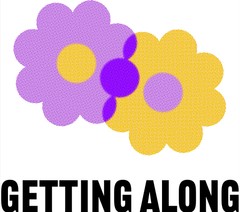Getting Along is a column about taking care of yourself, setting boundaries, and having difficult conversations, for people who struggle with all three.
Advertisement
“Since so many of us are communicating digitally so much more, and since there's less ability to be with each other physically, I think we see a lot more confusion about exactly how people are doing,” said Andrea Bonior, a therapist and the author of Detox Your Thoughts: Quit Negative Self-Talk for Good and Discover the Life You've Always Wanted. “We don't have that grounding presence of being able to touch the person on the arm and look in their eye, and it gets confusing.”Still, there’s definitely more you can do that simply hitting the frowny-face reaction button and moving on with your day. Here are some tips to keep in mind.“We often stress about the perfect thing to say,” Bonior told VICE. “When in reality it’s the ‘being there.’” She suggested reaching out in a way that shows you’re willing to listen; you could say something like, “Hey, I’m sorry to hear you’re struggling; I’m here if you want to talk.”“There’s not necessarily going to be some magic elixir of words that are going to be so inspirational that they help the person feel better,” she said. “What’s important is the sense of connection, the sense of empathy, the sense of, Hey, I’m going to bear witness to what you’re going through and be there for you.”It’s also a good idea to have the conversation in private. “Go to the DMs or send them a text,” therapist Ryan Howes, author of Mental Health Journal for Men: Creative Prompts, Practices, and Exercises to Bolster Wellness, told VICE. “And say, ‘Hey, just checking in; I want to make sure you’re doing OK,’ or something like that.”
Don’t worry too much about what to say; instead, be prepared to listen.
Advertisement
If it’s pretty clear they aren’t doing great, you might want to avoid leading with “How are you?” (Answer: Not great, Bob!) Howes suggested using “I” statements instead. “You can say, ‘I’m concerned about you; is there anything I can do for you?’ That takes them out of their self for a second, like, Oh, that’s how I’m being perceived by the outside world—you’re concerned about me,” he said.If the person posting is, say, a former co-worker or friend from high school who you don’t have much of a relationship with, you might not be sure if it’s your place to get involved—or you might not want to set an expectation that you’ll be able to lend an ear frequently.“The first question to ask yourself is, ‘What is my endgame here?’” Bonior said. “‘Am I willing to get into a more personal thing with them where I initiate direct individual contact, and [take on] everything that comes from that? Or do I feel like I want to be part of a crowd of people who says something supportive, but I’m not going to be in the inner circle?’”“It’s up to you to decide,” she continued. “And part of it depends on how severely they seem to be hurting, and then on how much other support they seem to be getting.”Regardless of how well you know the person, Bonior said it’s important not to communicate a level of support you can’t actually offer. In that case, you might opt to say something like “Just wanted to let you know that I’m thinking of you” instead of, “I’m here if you want to talk.”
If you don’t know the person terribly well, tailor your response accordingly.
Advertisement
Don’t hesitate to bring the topic up offline, too.
Advertisement
“If they kind of brush that off during Zoom, then I think you go back with a text message or a DM later on and be like, ‘Hey, I am concerned about you,’” he said.You could be forgiven for looking at someone’s post and wondering, Are they depressed or are they just Extremely Online? When tweets and memes about topics like dissociation and even wanting to die regularly rack up hundreds of shares, it’s not always totally evident how serious the person posting is.“It's hard to know sometimes if it's a joke, or if it's a cry for help, or, you know, maybe both,” Howes said. “I don't think it's harmful to make that sort of an inquiry: I'm concerned; is there anything I can do? I think it's just going to show that you care. And maybe they'll, at worst, say, ‘Oh, no, you're overreacting.’ Fine. You're better safe than sorry.”Bonior agreed. “I always would say, err on the side of caution,” she said. “As embarrassing or weird as it might feel to overreact to something, it's far less devastating than to underreact. The stakes of [overreacting] are not nearly as high as what's much more common, which is people are putting stuff out there, and nobody's really taking it seriously.”“What a lot of people do is throw out feelers,” she continued. “And they want to see if someone takes them seriously. And if everybody assumes that they're just blowing off steam, then it's like, Well, nobody really wants to listen.”
Know that it’s totally OK to take their “jokes” about their mental health seriously.
Advertisement
One thing to consider: is this out of character for them? “Is this something that's out of the blue, out of the norm for them? Are they using language that seems different than what they would usually use?” Howes said. If so, that’s even more cause for concern.In an “lol but actually” situation, Bonior suggested saying something like this: “Hey, I’m not exactly sure what you meant by this, but when I hear people I care about talking that way, I get concerned, so I wanted to check in. You might have just been kidding around or blowing off steam, but if you are having these thoughts, or if you are feeling really helpless, I want you to know you can talk to me about it.”“If you see something clearly suicidal, always, always, always err on the side of over-caution. That means direct contact with the person,” Bonior said. She suggested saying something like, “I'm really concerned to hear you say this. Are you safe? How can I help you? Can I call someone for you?”If their post communicates serious hopelessness, major shame, or intense isolation and disruption in their life, that’s also a sign that you should reach out right away, according to Bonior.“Don’t be afraid of asking directly about thoughts of suicide,” she said. “Everybody wants to shy away from it because they’re afraid they’ll put the thought in someone’s head. There’s no evidence for that. Yes, there is suicide contagion, which happens when suicide is glorified or talked about in a positive way, or when somebody has died by suicide and that is given a lot of attention. That is very, very different than telling a friend directly that you're worried about them and you want to know if they've had thoughts of hurting themselves—because that actually opens the door for them to be able to talk to you.”
Don’t ignore or dismiss suicidal ideation.
Advertisement

